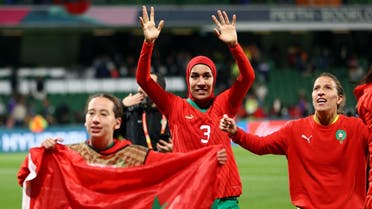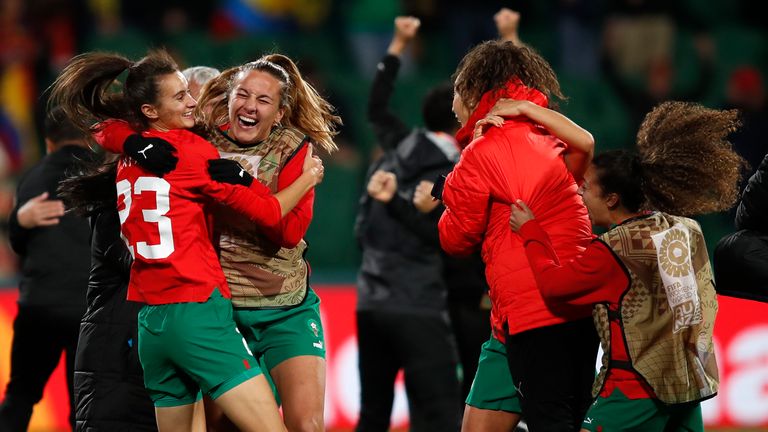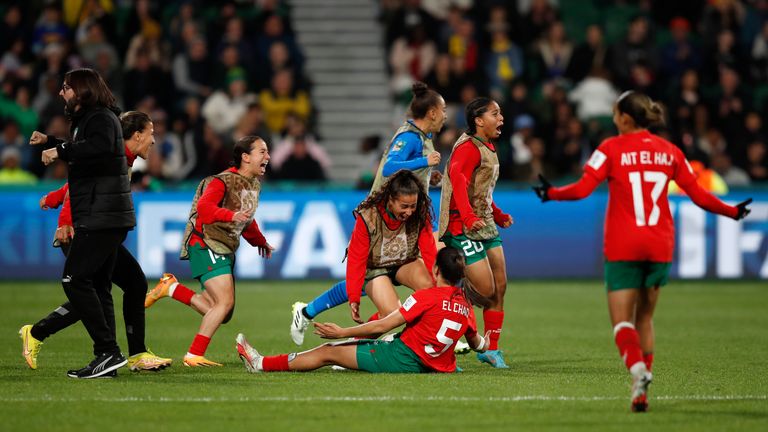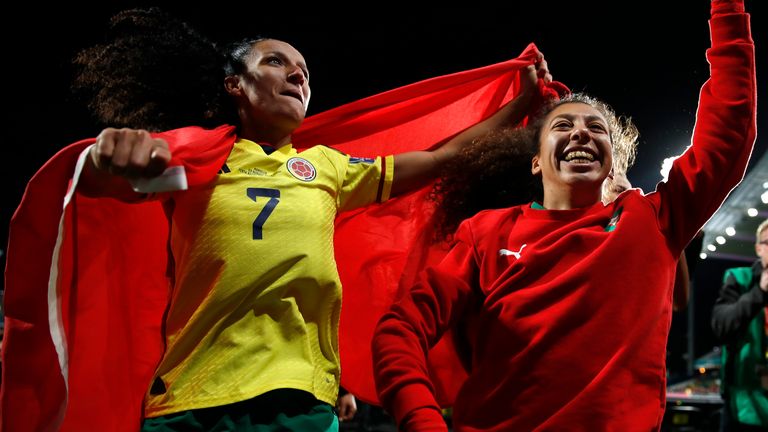HERSTORY
Morocco wins 1-0 over Colombia to reach Women’s World Cup knockout round
Morocco’s Nouhaila Benzina #3 celebrates after the match as Morocco
qualifies for the knockout stages of the World Cup. (Reuters)
The Associated Press
Published: 03 August ,2023
Morocco beat Colombia 1-0 to make it to the Women’s World Cup knockout round, creating yet more history at the global tournament.
Morocco is the first Arab or North African nation to go beyond the group stage at the Women’s World Cup, and the only one of eight tournament newcomers to advance.
Morocco’s winning goal came in first-half stoppage time, when Anissa Lahmari put back a penalty-save rebound.
The win meant Morocco qualifies in second place in the group, behind Colombia, and knocking two-time champion Germany out of the tournament. No. 2-ranked Germany needed a win over South Korea in a game being played simultaneously in Brisbane, but was held to a 1-1 draw.
If Morocco’s qualification for the Women’s World Cup inspired a generation, this will cement the legacy of the Atlas Lionesses.
The Associated Press
Published: 03 August ,2023
Morocco beat Colombia 1-0 to make it to the Women’s World Cup knockout round, creating yet more history at the global tournament.
Morocco is the first Arab or North African nation to go beyond the group stage at the Women’s World Cup, and the only one of eight tournament newcomers to advance.
Morocco’s winning goal came in first-half stoppage time, when Anissa Lahmari put back a penalty-save rebound.
The win meant Morocco qualifies in second place in the group, behind Colombia, and knocking two-time champion Germany out of the tournament. No. 2-ranked Germany needed a win over South Korea in a game being played simultaneously in Brisbane, but was held to a 1-1 draw.
If Morocco’s qualification for the Women’s World Cup inspired a generation, this will cement the legacy of the Atlas Lionesses.
The Moroccans were trounced 6-0 by Germany in their debut game in the tournament, but bounced back with consecutive wins over South Korea and a Colombia team that had been growing in confidence after edging Germany.
Colombia had its best scoring chance in the 59th minute, when its 18-year-old superstar, Linda Caicedo, served a ball to the far post, which Daniela Montoya one-timed to the left of goalkeeper Khadija Er-Rmichi. Er-Rmichi made a kick save, blocking the ball with just the front edge of her right cleat.
In the 69th, Caicedo, after a long run, stopped and leaned on the field barrier, reaching down to her left ankle and foot. She appeared hobbled for several minutes but stayed in the match.
Why it matters
Moroccan football fans have had plenty of celebrate with their national teams at the World Cup. The Atlas Lionesses had created history just by qualifying, and then just by scoring their first win. Beating Colombia to knock Germany out of the tournament was completely unexpected for most.
Morocco’s men’s team also made World Cup history last year. In the 2022 men’s World Cup, the Atlas Lions advanced to the round of 16 for the first time since 1986 and became the first African or Arab nation to reach a World Cup semifinal.
Colombia wins its group for the first time in team history and is in the knockout rounds for the first time since 2015.
What’s next
Morocco, as the Group H runner-up, will play Group F winner France in Adelaide on Tuesday. Colombia will play Group F runner-up Jamaica the same day in Melbourne.
Morocco stuns Colombia to reach last 16 in World Cup, eliminates Germany
Morocco is the first Arab or North African nation to go beyond the group stage at the Women’s World Cup, and the only one of eight tournament newcomers to advance.

Morocco's goalkeeper Khadija Er-Rmichi (centre) celebrates her team's victory and qualification to the knockout stage after the end of the Australia and New Zealand 2023 Women's World Cup Group H football match between Morocco and Colombia at Perth Rectangular Stadium in Perth on Thursday.
First Hijabi footballer and first Arab team debut in women’s World Cup
Nouhaila Benzina became the first hijabi footballer to participate in the FIFA Women’s World Cup as she played for Morocco’s debut match against Germany.

The 25-year-old footballer, who also plays for the Moroccan Royal Army Football Club (FAR), joined the national team in 2018. / Photo: Reuters
History has been made at the FIFA Women's World Cup as Nouhaila Benzina, the first hijabi footballer, takes the field to represent the Moroccan National team, known as "The Atlas Lionesses."
The occasion also marks the first time a women's team from the Middle East and North Africa has competed in the prestigious tournament. Although Morocco lost to Germany by a score of 6-0 on Monday at Melbourne Rectangular Stadium, football enthusiasts from the Arab world are hopeful for their strong comeback.
Benzina, the 25-year-old footballer, who also plays for the Moroccan Royal Army Football Club (FAR), joined the national team in 2018. Prior to that, the Moroccan defender showcased her talent while playing for Morocco's U-20 team in 2017.
Her presence on the field is particularly significant given the debates that have surrounded the inclusion of hijab in sports. Nouhaila stands as a testament to the resilience and determination of Muslim women who fought for years to lift the Islamophobic ban imposed by FIFA on wearing the hijab.
FIFA’s ban on hijab
The ban, which was in place until 2014, had detrimental effects on aspiring hijabi players worldwide. One of the earliest cases was that of Asma Mansour in 2007, who was barred from playing in a tournament in Quebec for wearing her hijab. It was incidents like these that sparked a movement advocating for the right to wear a hijab while playing football.
In 2014, FIFA finally lifted its ban on head coverings. This decision was a significant victory for Muslim women's collective efforts to be fully included in the sport they love.
France’s exclusion of hijabis from football
However, despite FIFA's policy change, France and the French Football Federation (FFF) still exclude hijabi players from football. The controversial law passed in France in 2004 prohibits "any sign or clothing clearly showing political, philosophical, religious, or union affiliation." This includes hijabs on the football pitch.
Last month, France's highest administrative court, Le Conseil d'Etat, ruled in favor of the FFF's ban on religious symbols, even if it limits freedom of expression and conviction. This ruling contradicted FIFA's policy, causing frustration and disappointment among aspiring French Muslim female soccer players.
Les Hijabeuses
Groups like "Les Hijabeuses" emerged to challenge the ban and fight for the right to wear a hijab while playing football. Comprising at least 80 hijabi football players in France, Les Hijabeuses used social media, petitions, and support from the sports community, including Nike, to advocate for their cause.
"What we want is to be accepted as we are, to implement these grand slogans of diversity, inclusiveness," said Founé Diawara, the president of Les Hijabeuses, to The New York Times. "Our only desire is to play soccer."
The group provided a safe space for Muslim women to play football, connect with others, and encourage young Muslim women to embrace the sport.
Nouhaila Benzina's historic presence at the World Cup not only represents progress but also serves as an inspiration to countless other hijabi players who share a passion for the beautiful game. Her impact transcends the field, fostering a message of empowerment, inclusivity, and representation. As she steps onto the pitch, Nouhaila's achievements remind us all that barriers can be broken and dreams can be realized, no matter what one wears.
Today the world has witnessed a significant milestone in football history—one that showcases the power of perseverance, the strength of unity, and the joy of playing the sport we all love.
SOURCE: TRTWORLD AND AGENCIES
Morocco is the first Arab or North African nation to go beyond the group stage at the Women’s World Cup, and the only one of eight tournament newcomers to advance.

Morocco's goalkeeper Khadija Er-Rmichi (centre) celebrates her team's victory and qualification to the knockout stage after the end of the Australia and New Zealand 2023 Women's World Cup Group H football match between Morocco and Colombia at Perth Rectangular Stadium in Perth on Thursday.
(Colin Murty/AFP)
Morocco beat Colombia 1-0 to make it to the Women’s World Cup knockout round, creating yet more history at the global tournament jointly hosted by Australia and New Zealand.
Morocco is the first Arab or North African nation to go beyond the group stage at the Women’s World Cup, and the only one of eight tournament newcomers to advance.
Morocco’s winning goal came in first-half stoppage time, when Anissa Lahmari put back a penalty-save rebound.
The win meant Morocco qualifies in second place in the group, behind Colombia, and knocking two-time champion Germany out of the tournament.
No. 2-ranked Germany needed a win over South Korea in a game being played simultaneously in Brisbane, but was held to a 1-1 draw.
The Moroccans were trounced 6-0 by Germany in their debut game in the tournament, but bounced back with consecutive wins over South Korea and a Colombia team that had been growing in confidence after edging Germany.
Colombia had its best scoring chance in the 59th minute, when its 18-year-old superstar, Linda Caicedo, served a ball to the far post, which Daniela Montoya one-timed to the left of goalkeeper Khadija Er-Rmichi. Er-Rmichi made a kick save, blocking the ball with just the front edge of her right cleat.
In the 69th, Caicedo, after a long run, stopped and leaned on the field barrier, reaching down to her left ankle and foot. She appeared hobbled for several minutes but stayed in the match.
Moroccan soccer fans have had plenty of celebrate with their national teams at the World Cup. The Atlas Lionesses had created history just by qualifying, and then just by scoring their first win. Beating Colombia to knock Germany out of the tournament was completely unexpected for most.
Morocco’s men’s team also made World Cup history last year.
In the 2022 men’s World Cup, the Atlas Lions advanced to the round of 16 for the first time since 1986 and became the first African or Arab nation to reach a World Cup semifinal.
Colombia wins its group for the first time in team history and is in the knockout rounds for the first time since 2015.
Morocco, as the Group H runner-up, will play Group F winner France in Adelaide on Tuesday.
Colombia will play Group F runner-up Jamaica the same day in Melbourne.

Morocco’s winning goal came in first-half stoppage time, when Anissa Lahmari put back a penalty-save rebound. (Luisa Gonzalez/Reuters)
SOURCE: TRTWORLD AND AGENCIES
Morocco beat Colombia 1-0 to make it to the Women’s World Cup knockout round, creating yet more history at the global tournament jointly hosted by Australia and New Zealand.
Morocco is the first Arab or North African nation to go beyond the group stage at the Women’s World Cup, and the only one of eight tournament newcomers to advance.
Morocco’s winning goal came in first-half stoppage time, when Anissa Lahmari put back a penalty-save rebound.
The win meant Morocco qualifies in second place in the group, behind Colombia, and knocking two-time champion Germany out of the tournament.
No. 2-ranked Germany needed a win over South Korea in a game being played simultaneously in Brisbane, but was held to a 1-1 draw.
The Moroccans were trounced 6-0 by Germany in their debut game in the tournament, but bounced back with consecutive wins over South Korea and a Colombia team that had been growing in confidence after edging Germany.
Colombia had its best scoring chance in the 59th minute, when its 18-year-old superstar, Linda Caicedo, served a ball to the far post, which Daniela Montoya one-timed to the left of goalkeeper Khadija Er-Rmichi. Er-Rmichi made a kick save, blocking the ball with just the front edge of her right cleat.
In the 69th, Caicedo, after a long run, stopped and leaned on the field barrier, reaching down to her left ankle and foot. She appeared hobbled for several minutes but stayed in the match.
Moroccan soccer fans have had plenty of celebrate with their national teams at the World Cup. The Atlas Lionesses had created history just by qualifying, and then just by scoring their first win. Beating Colombia to knock Germany out of the tournament was completely unexpected for most.
Morocco’s men’s team also made World Cup history last year.
In the 2022 men’s World Cup, the Atlas Lions advanced to the round of 16 for the first time since 1986 and became the first African or Arab nation to reach a World Cup semifinal.
Colombia wins its group for the first time in team history and is in the knockout rounds for the first time since 2015.
Morocco, as the Group H runner-up, will play Group F winner France in Adelaide on Tuesday.
Colombia will play Group F runner-up Jamaica the same day in Melbourne.

Morocco’s winning goal came in first-half stoppage time, when Anissa Lahmari put back a penalty-save rebound. (Luisa Gonzalez/Reuters)
SOURCE: TRTWORLD AND AGENCIES
First Hijabi footballer and first Arab team debut in women’s World Cup
Nouhaila Benzina became the first hijabi footballer to participate in the FIFA Women’s World Cup as she played for Morocco’s debut match against Germany.

The 25-year-old footballer, who also plays for the Moroccan Royal Army Football Club (FAR), joined the national team in 2018. / Photo: Reuters
History has been made at the FIFA Women's World Cup as Nouhaila Benzina, the first hijabi footballer, takes the field to represent the Moroccan National team, known as "The Atlas Lionesses."
The occasion also marks the first time a women's team from the Middle East and North Africa has competed in the prestigious tournament. Although Morocco lost to Germany by a score of 6-0 on Monday at Melbourne Rectangular Stadium, football enthusiasts from the Arab world are hopeful for their strong comeback.
Benzina, the 25-year-old footballer, who also plays for the Moroccan Royal Army Football Club (FAR), joined the national team in 2018. Prior to that, the Moroccan defender showcased her talent while playing for Morocco's U-20 team in 2017.
Her presence on the field is particularly significant given the debates that have surrounded the inclusion of hijab in sports. Nouhaila stands as a testament to the resilience and determination of Muslim women who fought for years to lift the Islamophobic ban imposed by FIFA on wearing the hijab.
FIFA’s ban on hijab
The ban, which was in place until 2014, had detrimental effects on aspiring hijabi players worldwide. One of the earliest cases was that of Asma Mansour in 2007, who was barred from playing in a tournament in Quebec for wearing her hijab. It was incidents like these that sparked a movement advocating for the right to wear a hijab while playing football.
In 2014, FIFA finally lifted its ban on head coverings. This decision was a significant victory for Muslim women's collective efforts to be fully included in the sport they love.
France’s exclusion of hijabis from football
However, despite FIFA's policy change, France and the French Football Federation (FFF) still exclude hijabi players from football. The controversial law passed in France in 2004 prohibits "any sign or clothing clearly showing political, philosophical, religious, or union affiliation." This includes hijabs on the football pitch.
Last month, France's highest administrative court, Le Conseil d'Etat, ruled in favor of the FFF's ban on religious symbols, even if it limits freedom of expression and conviction. This ruling contradicted FIFA's policy, causing frustration and disappointment among aspiring French Muslim female soccer players.
Les Hijabeuses
Groups like "Les Hijabeuses" emerged to challenge the ban and fight for the right to wear a hijab while playing football. Comprising at least 80 hijabi football players in France, Les Hijabeuses used social media, petitions, and support from the sports community, including Nike, to advocate for their cause.
"What we want is to be accepted as we are, to implement these grand slogans of diversity, inclusiveness," said Founé Diawara, the president of Les Hijabeuses, to The New York Times. "Our only desire is to play soccer."
The group provided a safe space for Muslim women to play football, connect with others, and encourage young Muslim women to embrace the sport.
Nouhaila Benzina's historic presence at the World Cup not only represents progress but also serves as an inspiration to countless other hijabi players who share a passion for the beautiful game. Her impact transcends the field, fostering a message of empowerment, inclusivity, and representation. As she steps onto the pitch, Nouhaila's achievements remind us all that barriers can be broken and dreams can be realized, no matter what one wears.
Today the world has witnessed a significant milestone in football history—one that showcases the power of perseverance, the strength of unity, and the joy of playing the sport we all love.
SOURCE: TRTWORLD AND AGENCIES
Morocco 1-0 Colombia: North Africans make history to qualify for last 16 of Women's World Cup alongside Colombia
Match report as Morocco beat Colombia as both sides progress to the last 16; North African nation make history and qualify on debut.
Thursday 3 August 2023

Morocco beat Colombia 1-0 to reach the Women's World Cup knockout stages, creating yet more history at the tournament.
Morocco have become the first Arab or North African nation to go beyond the group stages at the Women's World Cup, and the only one of eight tournament newcomers to advance.
Their winning goal came in first-half stoppage time, when Anissa Lahmari scored from a penalty rebound, after captain Ghizlane Chebbak saw her spot-kick saved.
The win means Morocco qualify second place in the group, behind Colombia, and their win ensured two-time champions Germany could not progress. The No 2-ranked side needed a win over South Korea in a game being played simultaneously in Brisbane, but were held to a 1-1 draw.
 Image:The Morocco players were in tears as they qualified for the last 16 of the Women's World Cup
Image:The Morocco players were in tears as they qualified for the last 16 of the Women's World Cup
If Morocco's qualification for the Women's World Cup inspired a generation, this will cement the legacy of the Atlas Lionesses.
Why it matters?
Moroccan football fans have had plenty to celebrate with their national teams in recent years. The Atlas Lionesses had created history just by qualifying for the World Cup, and then just by securing their first win. Beating Colombia to knock Germany out of the tournament was completely unexpected for most.
Morocco's men's team also made World Cup history last year. In the 2022 men's World Cup, the Atlas Lions advanced to the round of 16 for the first time since 1986 and became the first African or Arab nation to reach a World Cup semi-final.
For Colombia, meanwhile, they topped the group for the first time in their history and reached the knockout rounds for the first time since 2015.
What's next?
Morocco, as the Group H runners-up, will play Group F winners France in Adelaide on Tuesday. Colombia face Group F runners-up Jamaica the same day in Melbourne.
What is the schedule?
With the group stage now over, group winners and runners-up progress to the round of 16, which takes place from August 5 to August 8.
The quarter-finals, which will be held in Wellington, Auckland, Brisbane and Sydney, are scheduled for August 11 and 12.
The first semi-final will then be played on August 15 in Auckland, with the other semi-final taking place on August 16 at the Accor Stadium in Sydney, which will then host the final on August 20.
A third-place play-off will be played the day before the final on August 19 in Brisbane.
Match report as Morocco beat Colombia as both sides progress to the last 16; North African nation make history and qualify on debut.
Thursday 3 August 2023

Morocco finished second in Group H after their 1-0 win over Colombia to reach the last 16 of the Women's World Cup
Morocco beat Colombia 1-0 to reach the Women's World Cup knockout stages, creating yet more history at the tournament.
Morocco have become the first Arab or North African nation to go beyond the group stages at the Women's World Cup, and the only one of eight tournament newcomers to advance.
Their winning goal came in first-half stoppage time, when Anissa Lahmari scored from a penalty rebound, after captain Ghizlane Chebbak saw her spot-kick saved.
The win means Morocco qualify second place in the group, behind Colombia, and their win ensured two-time champions Germany could not progress. The No 2-ranked side needed a win over South Korea in a game being played simultaneously in Brisbane, but were held to a 1-1 draw.
 Image:The Morocco players were in tears as they qualified for the last 16 of the Women's World Cup
Image:The Morocco players were in tears as they qualified for the last 16 of the Women's World CupIf Morocco's qualification for the Women's World Cup inspired a generation, this will cement the legacy of the Atlas Lionesses.
The Moroccans were trounced 6-0 by Germany in their debut game in the tournament, but bounced back with consecutive wins over South Korea and a Colombia team that had been growing in confidence after edging Germany.
Colombia had its best scoring chance in the 59th minute, when its 18-year-old superstar, Linda Caicedo, delivered a ball to the far post, but Daniela Montoya's first-time effort was saved by the outreached leg of goalkeeper Khadija Er-Rmichi.

Colombia had its best scoring chance in the 59th minute, when its 18-year-old superstar, Linda Caicedo, delivered a ball to the far post, but Daniela Montoya's first-time effort was saved by the outreached leg of goalkeeper Khadija Er-Rmichi.

Colombia top Group H after beating both Germany and South Korea in their opening games, celebrating alongside Morocco
Why it matters?
Moroccan football fans have had plenty to celebrate with their national teams in recent years. The Atlas Lionesses had created history just by qualifying for the World Cup, and then just by securing their first win. Beating Colombia to knock Germany out of the tournament was completely unexpected for most.
Morocco's men's team also made World Cup history last year. In the 2022 men's World Cup, the Atlas Lions advanced to the round of 16 for the first time since 1986 and became the first African or Arab nation to reach a World Cup semi-final.
For Colombia, meanwhile, they topped the group for the first time in their history and reached the knockout rounds for the first time since 2015.
What's next?
Morocco, as the Group H runners-up, will play Group F winners France in Adelaide on Tuesday. Colombia face Group F runners-up Jamaica the same day in Melbourne.
What is the schedule?
With the group stage now over, group winners and runners-up progress to the round of 16, which takes place from August 5 to August 8.
The quarter-finals, which will be held in Wellington, Auckland, Brisbane and Sydney, are scheduled for August 11 and 12.
The first semi-final will then be played on August 15 in Auckland, with the other semi-final taking place on August 16 at the Accor Stadium in Sydney, which will then host the final on August 20.
A third-place play-off will be played the day before the final on August 19 in Brisbane.

No comments:
Post a Comment